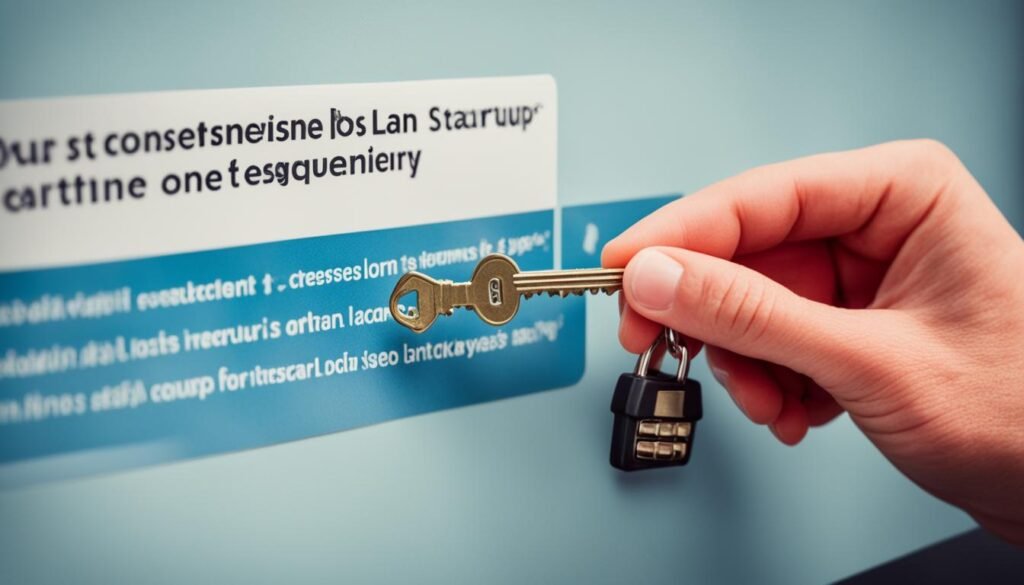Table of Contents
ToggleBusiness Loans For Start Up are tough to get because lenders often require a certain amount of time in business. You could look into loans that fit specific needs, like a startup SBA loan. First, figure out how much money you can realistically borrow. Assessing your budget and debts is important.
It can be hard to get a loan without a proven track record of success. Lenders need to know you’ll pay them back. But starting, you might not have the data to show how likely you are to repay your loan. Yet, getting a loan as a isn’t impossible.
In the 2023 Small Business Credit Survey, only 40 percent of businesses under five years old were approved for loans. In contrast, 53 percent of businesses between six to 20 years received approval. To increase your chances of approval Business Loans For Startup, find lenders with less strict time in business rules, maybe three to six months. Also, ensure you’re applying for what you really need, have a solid business plan, and know the type of loan and lender that would work best for you.
Key Takeaways
- Startup business loans can be difficult to obtain due to minimum time in business requirements by lenders.
- Assess your business budget and expenses to determine the appropriate loan amount you can afford.
- Look for lenders with low time in business requirements, such as 3-6 months, for the best chance of approval.
- Follow a step-by-step process to apply for the right type of funding and loan amount.
- Be prepared to provide a solid business plan and potentially collateral to secure the loan.
Determine How Much Funding You Need
Some business owners make a big mistake when asking for too much funding. They risk getting into trouble with high interest or even failing to pay back the loan. If your request is too high, lenders might say no. To avoid this, work on a detailed financial forecast. This should list all your income and expenses. It helps to see clearly the right amount to ask for in a loan. This way, your business can stay afloat till you make enough revenue.
Use a Business Loan Calculator
A business loan calculator comes in handy. It helps estimate your monthly payments. This way, you can check if they match your business budget.
Decide the Type of Loan You Need
Different business loans meet different needs. Lines of credit are like a flexible business credit card. They offer quick money for various uses. Equipment financing gives a lump sum. You must use the bought equipment as a promise to repay the loan.
Startups often seek alternative financing. They might use personal funds or get help from friends and family. This was found in the 2023 Small Business Credit Survey. It showed that 36% of younger startups used such sources. Despite this, there are suitable business loans available. These can meet your needs without using your personal money.
Term Loans
Term loans cover many business costs. You can use them to buy equipment, land, or even another business. They are paid back every month for a set time. The interest rates might stay the same or change.
Business Lines of Credit
Business lines of credit give business owners ready money. They can use this money for expenses like payroll or inventory. Business owners can keep using this money as they pay it back. This is called a revolving line of credit.
SBA Loans
SBA loans come from special lenders approved by the U.S. Small Business Administration. They have good interest rates. You can use this loan for many things like running costs, buying equipment, or improving real estate.
Equipment Financing
Equipment financing helps businesses buy what they need. This could be equipment, machinery, or any business assets. The loan uses the bought things as security. This helps get lower interest rates.
Microloans
Microloans are small loans, usually between $50,000 and $150,000. The SBA or nonprofits might provide them. They can be good for startups or those with not so good credit.
Check Your Eligibility Criteria

To see if you qualify for a startup business loan, there are a few steps. Lenders set different rules based on the loan type and who they are. They often check your business’s time in business, personal credit score, and annual revenue.
Yet, it’s more than just this. Lenders think about a lot of things. They might look at your business credit score and personal guarantee. They also care about how much you’ve made over time. And they check how well you’ve handled debts before.
business loans for start up

Some lenders help business owners with low credit scores in the 500s and 600s. However, the loans come with high interest rates. This is because the lenders take on a big risk by giving these loans. Online lenders are usually more flexible. They might look at your business credit score. But, they often focus more on your personal credit history. This is especially true when you’re launching a new business.
Personal Credit Score Requirements
To get a business loan, you typically need to personally guarantee it. This means you’ll pay back the loan with your own money if the business can’t. Traditional bank lenders usually need you to have two or more years of business under your belt. But, this could be a problem for new businesses. Online lenders might only ask for six months of operation. A few might even help businesses that are just three months old.
Business Credit Score
To qualify for a loan, your business must meet certain revenue requirements. Lenders often ask for $100,000 to $250,000 in yearly revenue. For startups, reaching these figures can be tough. It’s crucial to find lenders who are willing to work with businesses that earn less.
Personal Guarantee
To secure a business loan, you might need to offer a personal guarantee. This means you will pay the loan from your personal money if the business cannot. It’s a common practice among lenders.
Time in Business Requirements
Traditional bank lenders typically require two years of business history for a loan. However, this can be a barrier for new businesses. Online lenders are often more lenient, sometimes looking for just six months of activity. A select few may even offer loans to startups that are three months old or less.
Annual Revenue Thresholds
Lenders will check if your business makes enough money to repay a loan, often needing $100,000 to $250,000 in yearly revenue. For startups, reaching these figures can be challenging. It’s wise to look for lenders that are willing to work with businesses at lower revenue levels.
Compare Lenders and Loan Options

Looking for a startup business loan? Online lenders often have better chances for approval. But, you should look at all types of lenders, including banks. It’s important to check out interest rates, loan terms, and loan amounts.
Don’t forget to look into the application process and how fast you’ll get the money. Also, check the fees you might have to pay. Getting prequalified can help you see if the lender is a good fit. It also tells you the cost of the loan.
Some great places to get a startup business loan are Taycor Financial, Funderial, and Credibly. Others include Accion Opportunity Fund, PayPal, and Bank of America.
Interest Rates and APRs
The interest rates on startup business loans can change a lot. It depends on the lender, your credit score, and how long you’ve been in business. Online lenders often have higher rates due to the risk of new businesses. Banks may offer lower rates to those who qualify.
Fees and Other Costs
It’s wise to look at more than just the interest rate. Check the loan for any extra fees, like origination fees or penalties for paying early. These extra costs can make the loan much more expensive.
Lender Reputation
When you check out lenders, make sure to see what other people say. Go for lenders that have happy customers, fund quickly, and are clear about their terms. A good lender can make your business loan process easier and more secure.
Gather Required Documentation
When you’re ready for a startup business loan, you’ll need certain documents. This includes your personal details, your company’s business license, and EIN.
Personal and Business Information
You should have personal information, company documents, and your EIN ready.
Next, you need to provide your
Financial Statements
Your balance sheet, business and personal tax returns are necessary. You should also have cash flow, profit and loss statements, and recent bank statements. Include business debts, outstanding invoices for invoice factoring.
To show your business is solid, prepare a
Business Plan and Projections
Include financial projections and your loan use plan. The lender might ask for Collateral Information. Share info on real estate or equipment you could use as loan security.
Having all these documents ready makes applying easy. It creates a strong loan application, showing your business is solid and able to repay.
Submit Your Loan Application

When you pick a lender, get to know how they like to get applications and collect the right documents. Every lender has its own way of doing things, so find out if you can apply online, by phone, or in person.
After you apply, someone from the lender might call you to ask for more documents like proof of what you’re offering as security or more financial info.
Understand Loan Requirements for Startups

Starting a startup means you need to show a strong business plan. It must prove your business can succeed and you can pay back the loan. Lenders might ask for something valuable, like property or equipment, to secure the loan.
This valuable item, or collateral, is a safety net for the lender. It’s used if you can’t make the loan payments.
Solid Business Plan
Your business plan is like a roadmap to success. Lenders will carefully check it to see if your startup can really take off. Your plan should cover your business idea, who you’re selling to, money forecasts, and your team.
An in-depth and well-researched business plan shows lenders you’re serious. It’s a key step in proving your startup can make money and repay the loan.
Collateral Requirements
Along with a good business plan, you might need to offer collateral. This could be property, equipment, or inventory. The lender can take this stuff if you can’t pay back the loan.
Having collateral can help you get a better deal on the loan. This might mean you pay less interest or have more time to pay it back.
Consider Alternative Funding Sources
Startups face hurdles in getting traditional business loans business plan and cash flow. Yet, there are other ways to fund your idea startup business loans help new. From personal savings business loan can help soon as the next business to crowdfunding business grants for women business is already , you have options.
Personal Funds or Friends/Family
Many startups begin by using personal savings or borrowing from friends and family. This way, you dodge the strict rules of traditional loans. But, honesty and a clear payback plan are key personal and business credit scores business loan requirements funding for your startup.
Crowdfunding
Platforms like Kickstarter and Indiegogo offer a chance to pitch to the masses. Through a strong campaign, different types of startup loans you can share your vision and gather financial support. This is a great way to get people local small business development center excited about your idea.
Business Credit Cards
For daily costs or big buys, business credit cards are handy. They give you a flexible line of credit. But, keep in mind that the interest rates might be steep business loans typically traditional bank loans business credit card providers business line of credit allows.
Also Read : Understanding Business Loan Requirements
FAQs
Q: What are the different types of startup business loans available?
A: The different types of startup business loans include traditional business loans, short-term loans, small business loans, and personal loans.
Q: How can I improve my chances of getting approved for a startup loan?
A: To increase your chances of getting approved for a startup loan, you can build your business credit, check your credit score, and ensure your business has been operating for at least a certain period of time.
Q: What are some of the best startup business loans to consider?
A: Some of the best startup business loans to consider include American Express® Business Line of Credit, 12 startup business loans, and other financing options tailored for new businesses.
Q: I was denied a startup business loan. What should I do next?
A: If you were denied a startup business loan, you can consider alternative funding options such as business grants, small business loans, or working to improve your credit profile before reapplying.
Q: How can a business loan help me grow my startup?
A: A business loan can provide the necessary capital to invest in resources, expand operations, hire more staff, or launch new products/services, ultimately helping your startup grow and thrive.
Q: What are the typical requirements to qualify for a startup business loan?
A: The typical requirements to qualify for a startup business loan may include a minimum number of years in business, a certain credit score, business financial records, and a detailed business plan.
Q: How do I apply for a startup business loan?
A: To apply for a startup business loan, you can research different lenders, prepare all required documentation including business financials and personal credit scores, and submit your loan application through the lender’s platform or in-person.




